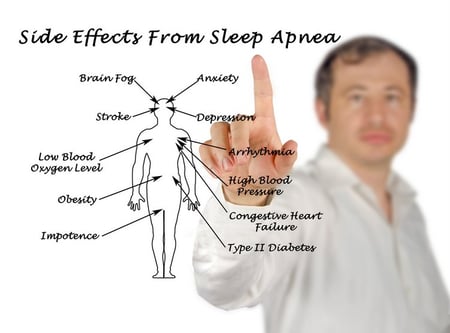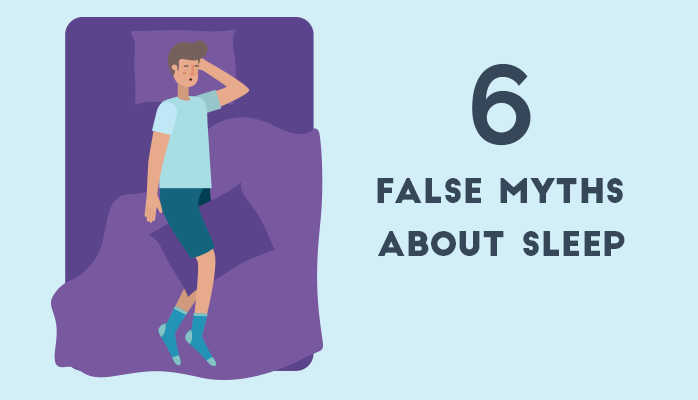Sleep myths are popular on social media, in memes, and in advice from parents and friends. Unlike many myths, which can be harmless, sleep myths may actually change your sleep behaviors in ways that negatively impact it.
While there are certainly more than six myths about sleep, here are six common myths, some (or all) of which you may have heard.
- If you can’t sleep, just stay in bed
- Snoring is just annoying
- Some people don’t need 7-9 hours of sleep
- Hit the snooze button to get extra sleep
- Using TV to fall asleep is affective
- A night cap will help you sleep
Let’s look at these 6 sleep myths in more detail.
Myth 1: If You Can’t Sleep, Just Stay in Bed
Most healthy sleepers take about 15 minutes to fall asleep. Factors that influence and prolong this number are:
- Insomnia
- Stress
- Anxiety
- Depression
These are just some of the many things that can keep you awake in bed. But simply staying in bed and powering your way through sleeplessness is not a good idea. It actually teaches your body to associate wakefulness with bed.
So what should you do? If you can’t sleep, get out of bed and do something different. Preferably, go into another room to do something different that does not involve screen, as the blue light they emit can keep you up. Instead, do something mellow like:
- Meditating
- Yoga
- Reading
- Writing
Myth 2: Snoring Is Just Annoying
 Snoring might be annoying for bed partners and guests, or it could require serious mitigation like ear plugs, but it’s not always harmless. Chronic snoring, especially loud snoring, is a primary sign of obstructive sleep apnea.
Snoring might be annoying for bed partners and guests, or it could require serious mitigation like ear plugs, but it’s not always harmless. Chronic snoring, especially loud snoring, is a primary sign of obstructive sleep apnea.
Obstructive sleep apnea is a condition where you continuously stop breathing and then have to rouse yourself in order to start breathing again. You won’t remember waking up, but the will experience varying levels of sleep deprivation.
The stop-breathing/wake-up cycle is called an apnea. This can happen dozens to hundreds of times per night, causing mild to severe sleep apnea.
Myth 3: Some People Are Fine on Less Than 6 hours of Sleep
There are many who think they can survive off 5-6 hours of sleep and function just fine. However, this is contrary to many scientific research papers that state otherwise.
The accepted standard for everyone is that 7-9 hours of sleep is ideal. While one may only sleep for 5 hours at a time, they will require extra sleeping time, such as naps, in order to supplement what they are lacking.
While someone might still be able to “function” on 5 hours of sleep, optimal functioning is at least 7 hours. Less than that results in poorer performance physically, mentally, and cognitively.
Myth 4: Hitting the Snooze Button is Worth It
Here’s an unfortunate fact: hitting the snooze button won’t increase the amount of quality sleep that you get. You will simply "snooze" at a level below deep sleep. At that point, it's better to just get out of bed, even it if it's hard!
Myth 5: TV is a Good Way to Fall Asleep
Tune in, relax, zone out, and finally fall asleep. This is a common nighttime routine. Unfortunately, TVs and screens don’t help with sleep. If your goal is to get good sleep then you should turn off the TV and shut your computers [Sleep.org].
For one, TVs screens emit blue light that delays and suppresses the release melatonin. Then there is the problem that TV and videos can emit unnatural, jarring noises that temporarily wake you up, even if you don’t remember waking up in the morning.
If you are one of the people who enjoys having “noise” to fall asleep to, consider getting a fan, small water feature in your room, or other form of white noise that is more natural and soothing.
Myth 6: A Night Cap Is Good for Sleep
If you are like many people, maybe even most people, a nightcap before bed is not uncommon. After all, a drink does help us relax and fall asleep. Unfortunately, while it may help you go to sleep, it will result in significantly reduced quality of sleep:
- It disrupts REM sleep, which is important for memory and learning
- Alcohol is a diuretic that may cause you to wake up and urinate in the middle of the night
Alcohol should be avoided in the hours leading up to bed. If you are used to having a nightcap before bed, you will likely experience a noticeable difference in wakefulness in the morning if you cut out your nightcap.
If you are struggling with sleep deprivation, here is a free online sleep test that will evaluate your sleep and put you in contact with one of our sleep health professionals:


